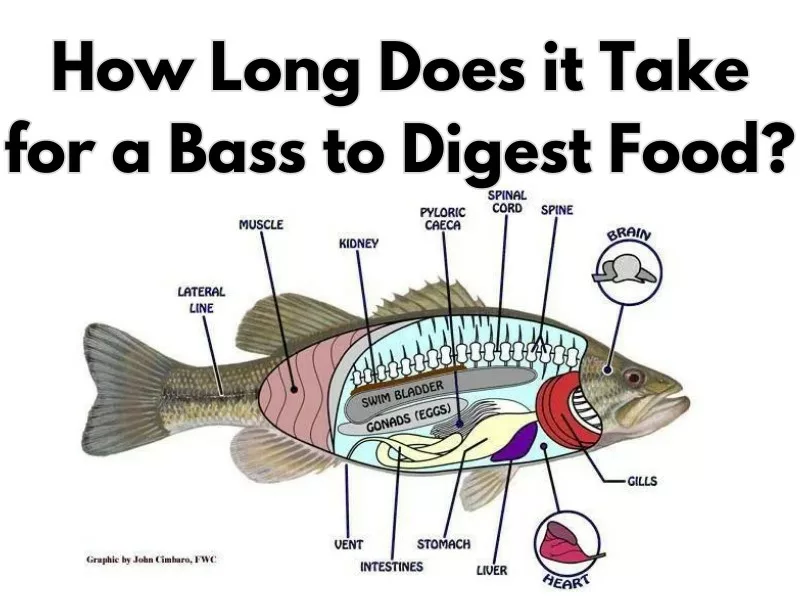As an avid angler or fish enthusiast, have you ever wondered how long it takes for a bass to digest its food? Knowing the answer to this question can be helpful in understanding the behavior of these fish and can even make a difference in your fishing tactics. In this article, we will explore the digestion process of bass and answer the question of how long it takes for a bass to digest its food.
What is the Digestion Process of a Bass?
Before we dive into the answer, let’s take a look at the digestion process of a bass. Like all animals, the digestive system of a bass is responsible for breaking down food into smaller components that can be absorbed and used by the body. The digestion process of a bass begins in the mouth, where it uses its teeth to bite and tear the food. The food is then passed to the esophagus, where it travels down to the stomach.
In the stomach, the food is mixed with digestive juices that break down the food further. From there, the food is passed to the intestines, where the nutrients are absorbed into the bloodstream and transported to the rest of the body. The waste products are then eliminated through the anus.
How Long Does it Take for a Bass to Digest Food?
Now, let’s get to the answer that you’ve been waiting for. The length of time it takes for a bass to digest its food depends on several factors, such as the size of the fish, the temperature of the water, and the type of food it consumed.
On average, it takes a bass around 24-48 hours to fully digest its food. However, this time frame can vary depending on the factors mentioned above. For example, a bass that consumes a large meal may take longer to digest it compared to a smaller meal. Similarly, a bass in warmer water temperatures may digest its food faster than one in colder water. Which in practice makes sense. Bass are biting a lot more frequently in warmer water where their food digests faster, than in cold water.
Factors Affecting the Digestion Process of a Bass
Let’s take a closer look at the factors that can affect the digestion process of a bass.
Size of the Fish
The size of the fish can play a significant role in the digestion process. Larger fish may take longer to digest their food compared to smaller ones. This is because larger fish have a larger stomach and digestive system, which takes more time to break down the food.
Water Temperature
Water temperature can also impact the digestion process of a bass. Fish in warmer water temperatures have a faster metabolism, which means they may digest their food faster compared to fish in colder water.
If the water temperature is below 50 degrees Fahrenheit, it may take a bass up to 36 hours to digest its food fully. This is because fish in colder water temperatures have a slower metabolism, which means it takes longer for them to digest their food compared to fish in warmer water temperatures. So, if you are fishing in colder water, it’s important to be patient and allow the bass enough time to digest their food before trying to catch them.
Type of Food
The type of food a bass consumes can also affect the digestion process. Fish that consume hard-to-digest foods, such as crustaceans or larger prey, may take longer to digest their food compared to those that consume smaller, easier-to-digest prey. Bass are opportunistic feeders, they’ll eat bugs, other fish and even snakes!
Conclusion
In conclusion, the digestion process of a bass plays a crucial role in its survival and behavior. Understanding how long it takes for a bass to digest its food can help you make better fishing decisions and even increase your chances of catching more fish. While the average time it takes for a bass to digest its food is around 24-48 hours, several factors can impact this time frame, such as the size of the fish, water temperature, and type of food consumed. This is why Spring and Summer are some of the best times to snag a Bass.
FAQs
What factors affect bass digestion time?
Several factors can affect how long it takes a bass to digest its food, including water temperature, meal size, feeding frequency, and the type of food being consumed. In general, colder water temperatures slow down the digestion process, while warmer water temperatures speed it up. Larger meals and infrequent feeding can also lead to longer digestion times, as the bass needs to break down and absorb more nutrients at once. Finally, certain types of food, such as hard-shelled crustaceans, can take longer to digest than soft-bodied prey like small fish.
How can I tell if a bass has finished digesting its food?
One way to tell if a bass has finished digesting its food is to examine its belly. If the belly looks shrunken or flat, this suggests that the fish has processed its meal and is ready to eat again. On the other hand, if the belly looks swollen or bulging, this may indicate that the fish is still digesting its food and may not be as interested in feeding. Another clue to look for is the color and texture of the fish’s feces. If the feces are dark and firm, this suggests that the fish has finished digesting its food, while soft or light-colored feces may indicate that digestion is still ongoing.
How long should I wait after feeding a bass before trying to catch it?
It’s generally a good idea to wait at least a few hours after feeding a bass before trying to catch it. This gives the fish enough time to fully digest its meal and return to its normal feeding behavior. However, the exact amount of time needed will depend on several factors, such as water temperature, meal size, and the individual feeding patterns of the fish. As a general rule, it’s best to observe the fish for signs that it has finished digesting its food, such as a shrunken belly or active feeding behavior, before attempting to catch it.
Can overfeeding harm bass?
Yes, overfeeding can harm bass, especially if they are fed too frequently or with large meals. When bass consume more food than they need, the excess nutrients can lead to a buildup of fat in their bodies, which can affect their overall health and reduce their growth rate. Overfeeding can also lead to digestive problems, such as bloating and constipation, which can be uncomfortable or even fatal for the fish. To avoid overfeeding, it’s important to feed bass in moderation and to monitor their feeding behavior and body condition regularly.
Do different types of bait affect bass digestion time?
Yes, different types of bait can affect bass digestion time, depending on their size, texture, and nutritional content. For example, live bait like worms or minnows may be easier for bass to digest than hard-bodied lures or plastic baits. Soft, oily baits like shad or crawfish may also be digested more quickly than harder or drier baits like grubs or jigs. However, the exact digestion time will depend on a variety of factors, including the size and frequency of the meals, the water temperature, and the individual metabolism of the fish.

